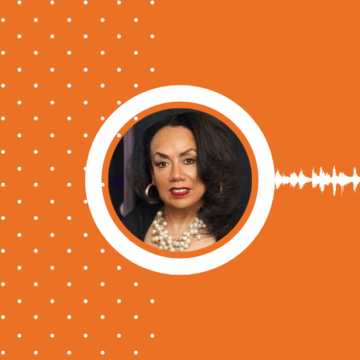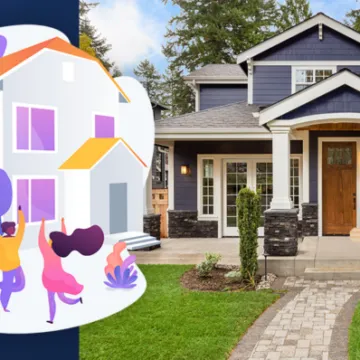In today’s economy, most people have to think creatively if they want to make a purchase, especially a large one like a house. That’s why the rent-to-own process has become so popular.
If you have less than perfect credit, can’t qualify for a traditional loan, or don’t have enough savings for a down payment, maybe rent-to-own ownership can help.
These purchase programs are a great way to get into the home you want, while also limiting your initial investment and risk. Rent-to-own agreements offer you the chance to have the security of a place to live now, with an option to buy the property at the end of a lease and specified period, for a predetermined price.
Here, we will talk about the pros and cons of rent-to-own homeownership and give you some tips on the rent-to-own process to help you figure out if it is right for you and how you can use it to your advantage.
What You Should Know About Rent-to-Own Programs Before You Start
A rent-to-own home allows a tenant to rent a property, but also gives them the option to buy it before the lease expires. Aside from the potential financial advantages, this live-in “test drive” offers a period of time before you choose whether you want to buy the home. This can be a great way to find out if you like the neighborhood, gives you a chance to save up cash and eliminate other debt, potentially putting you in an overall better position for you and your family
Before signing up for rent-to-own agreements, it’s important to understand a few key things about these kinds of contracts. The first is that they are not the same as purchasing a home in a traditional way with a mortgage loan. A typical rent-to-own arrangement has two parts: the rental lease agreement and the purchase option.
This means you have a written understanding with the owner on terms, a price, and a path toward eventual ownership. You have a right to break the lease, if you need to get out of it. You should also understand the property owner can void the agreement as well. Before you sign, know clearly what you are getting yourself into.
The rental lease agreement portion is similar to nearly any other lease. Under the agreement, you would consistently pay a set amount of rent while living in the home. This should also clearly explain the conditions of what you can and can’t do while in the property.
The purchase option portion of the agreement gives you the right to buy the home at some point in the future – either during the lease period or at the end.
These lease-purchase contracts lay out how the purchase price for the home will be determined and how, or if your rent payments would apply toward the purchase.
Although they can be more flexible, since you are dealing with an individual owner. Some rent-to-own agreements require good credit. This is because the owner will want to make sure you’re likely to pay, and on time. This does not mean you won’t be able to enter into lease-purchase contracts if you have bad credit, but it does mean you may pay a higher interest rate or monthly payment amount.
What are the Main Types of “Rent-to-Own” Contracts?
There are two main types of rent-to-own agreements: lease-option agreements and lease-purchase agreements. It is really important for you to know the difference, before getting started. Lease-option contracts give you the option to purchase the home after the agreed-upon leasing period ends. Lease-purchase contracts legally obligate you to buy the house after your lease ends. If you have questions about either, reach out to a professional for help. Rent-to-own contracts can be complicated. If you need help understanding Lease-option contracts, lease-purchase contracts or need clarity on what you are about to sign, ask questions and get help. A good place to start for financial questions is GreenPath. Call to set up an appointment with a trained professional at (888) 368-1970. Also, read this article for housing counseling, information and resources for renters.
The Pros of Rent-To-Own Home Programs
There are several pros of rent-to-own homeownership:
- Peace of mind – Rent-to-own allows you to get your foot in the door, as well as locate a great neighborhood where you can settle down. You don’t have to worry about homes outpricing your budget, because you can “lock-in” a payment and living situation you really like. This is important, if you plan on staying in an area for a long time and are concerned about rising prices.
- Credit scores – Landlords and potential rent-to-own sellers may be more accepting of past credit issues than traditional lenders like banks or mortgage companies. This can be helpful if your credit took a recent hit, but you are moving into a position to rebuild it in the near future.
- Improving your purchasing power – The rent credit portion of your agreement lets you save money towards the purchase price of the home. Remember, this is not the same as traditional equity, since you are not the owner yet. By approaching your agreement this way, you are investing in your future rather than investing in a home. It’s crucial to remember that any money saved in a bank should not be touched. If you tend to spend all of your money, this is important.
- Secure your purchase price – As external forces like inflation affect interest rates and housing prices, being able to lock in a price for a home you’re interested in can be important. A rent-to-own agreement should specify the final, agreed-upon purchase price of the house. It may be a bit higher than current market value, in a rising market, but that locked-in price could prove invaluable down the road, when it’s time to finish the agreement.
GreenPath Financial Service
Housing Counseling
Do you have questions about housing? Should you buy a home? Refinance your house? What if you can’t make your mortgage payments? Or your credit isn’t great? GreenPath can help.
The Cons of Rent-to-Own Home Programs
There are also several cons of rent-to-own homeownership:
- You could lose your money – Any premium payment or rent credits are non-refundable. So, if you back out of the agreement before the end, you will likely lose the money you have already paid. To state it again – think before you enter any rent-to-own agreements.
- Potential problems – There is always the potential for issues to arise with the landlord or owner. If they go into foreclosure or a lien is placed on the property, it can affect you as well. Those challenges must be resolved or they could void your agreement.
- Your price is locked in – This will sound familiar to one of the “pros.” Since the locked-in price can swing either way, having a fixed purchase price can be advantageous, if the market goes up, but may work against you, if prices dramatically fall.
- Issues with financing – If you don’t qualify for a loan by the end of the term of your rent-to-own contracts, you may have to find another place to live.
- Look out for scams – Be aware of contract language indicating an obligation to purchase, not an option. Do your homework and ask questions, before signing any documents.
What are Some Key Questions to Ask about Rent-to-Own?
A rent-to-own home can be great for your family and your financial future. While it’s tempting to picture yourself living in your new home, stay focused. You must be careful when making this significant decision, which may affect you and your family for years to come. To make an informed decision, you have to understand what you are getting into. Good questions now can save you frustration later.
Here is a list of questions to ask yourself and the homeowner before you move forward:
- How much do you need to move-in?
- Are you responsible for property maintenance during the lease period?
- How long before you have the option to buy the property?
- How much of your rent will be credited toward the property’s purchase price?
Does “Rent-to-Own” impact my credit score?
Accounts that are reported to the three major credit bureaus show up on your credit report. In general, rent-to-own agreements are not reported and should have no impact on your credit.
A rent-to-own home gives you the time you need to build up your credit score, but does not directly affect it.
The higher your credit score is, the better deal you’ll be able to secure, when it is time to apply for a mortgage loan. Having good to excellent credit scores lets you access far better interest rates, which translates to you paying less over the life of the loan.
If you need help getting a handle on your credit scores or need help understanding your credit, GreenPath offers resources to help, regardless of where you are financially.
What are other options besides “Rent-to-Own” to make home purchase affordable?
Rent-to-own homeownership is not your only option, if you are looking for ways to get into your dream home. One option is to work with a mortgage broker to get a more affordable loan. A mortgage broker works with multiple lenders and can help you find one that will fit your needs.
Depending on your particular situation, there may be other programs like FHA Loans, a homeowner voucher program, programs for service members and veterans, state programs, or bank-owned or foreclosure properties to give you an opportunity to buy a home.
How do I know if “Rent-to-Own” is right for me?
Ultimately, only you can decide whether or not a rent-to-own program is right for you. However, there are a few signs that indicate a rent-to-own program is a good option for you. If you’re working towards home ownership and don’t have the money saved up yet to make a down payment, a rent-to-own program can be a great way to get started, with fewer obstacles. Another sign that a rent-to-own program is right for you is if your credit has taken a hit or you don’t have a great financial history.
What are Resources that can Help with “Rent-to-Own”
Buying a home doesn’t have to be a source of stress. Getting into rent-to-own homes may be a viable option for some families. As with other financial decisions, having more information at your fingertips is always helpful, especially as you move through the rent-to-own process. Rent-to-own homeownership can put you in a great position for your financial future.
Start by understanding where you are financially and begin today creating a plan to get yourself on track. Access resources like those available at GreenPath.com as a starting point and don’t be shy about asking for help. As mentioned above, signing a rent-to-own contract is a huge step, so make sure you understand what you are doing.
If you are currently renting and want to buy a home, do some research, create a plan, and move forward confidently. A good place to start is to connect with a GreenPath housing counselor.










